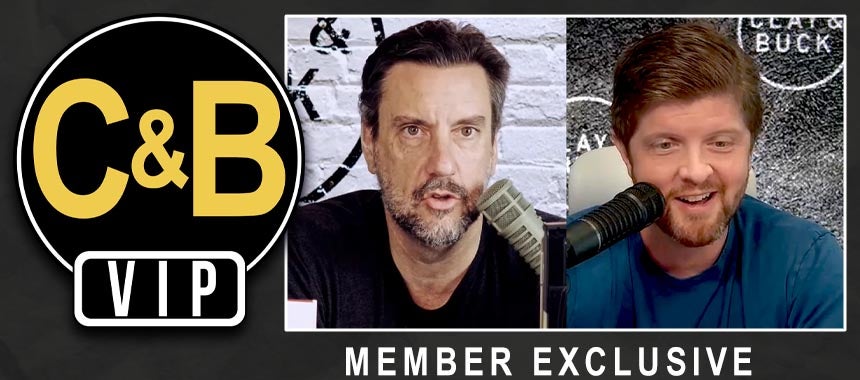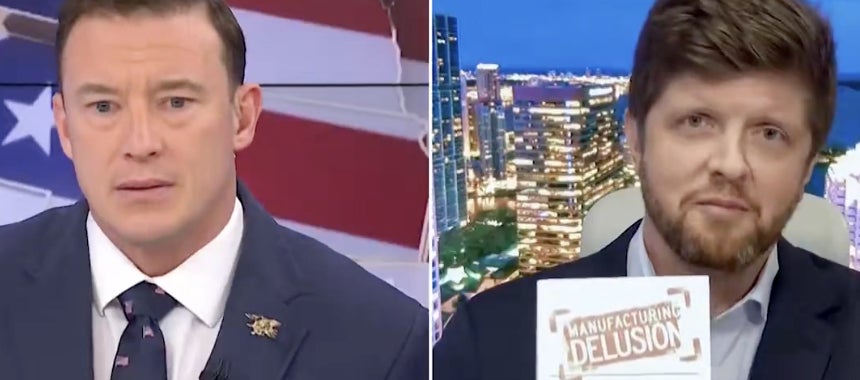Joe Weasel, Director of Fight for Football
2 Sep 2022
CLAY: This story, to me, is one that deserves to get way more attention and be talked about far more because it is an incredible success story. We’re joined now by Joe Weasel. He did a documentary, Fight for Football, about the battle to play college football in the fall of 2020. With college football back in earnest a lot last night, I bet Joe watched some of the games last night like I did. I was at the Tennessee game and then stayed up, watched late last night many of the other games that were going on.
Joe, I still think the general American public doesn’t know all the behind-the-scenes machinations that had to happen in order for college football to be played in 2020. I was one of the people who was interviewed in your documentary. What has the feedback been on the documentary? And what do people not know enough about as it pertains to the fall of 2020?
WEASEL: Well, Clay, first of all, I appreciate the fact that you agreed to be in the documentary because when it came to finding national writers, national reporters, that was kind of “whose side you were on.” If you remember, there was quite a division on to play or not to play, and these were people that covered the sport.
Fans — I’m getting a lot of positive feedback from fans because they fought for the season too. And there’s a lot that goes into that decision. We focused — we didn’t intend to — we focused a lot on what happened in the Big Ten. We saw what happened in the SEC. And, as you watched it evolve as we spoke to the reporters that covered those teams, it was a microcosm of the country.
People took a side. Everybody, you know, dug in. And I think what people didn’t know were some of the things you shared with us, the time you spent on the phone with Tim Pataki, an Ohio State grad who worked in the White House, how active the president was. You know, and I think one of the stories that gets underplayed a lot of is the effectiveness of those Nebraska football players and their parents.
CLAY: Yep.
WEASEL: Who sued the Big Ten. You know, you had a radio show. You were doing Fox I think back then. I remember you liked to put your legal hat on occasionally, your lawyer hat.
CLAY: Yeah.
WEASEL: And you said, I’m not sure if they have standing, but I’ll put my money on a Nebraska courtroom in Lincoln where the judge probably has some connection to the University of Nebraska.
CLAY: I like the idea from a legal perspective of being on the side of Nebraska Cornhusker football in Lincoln, Nebraska courtrooms, regardless of what the legal ramifications may be. Nebraska has some of the greatest fans in the country. And, yeah, so many people stood up. And that’s why — we’ve been talking some, Joe, on the show now.
 I know firsthand how hard many people in the Trump White House worked to get back to normalcy during covid and how hard they argued that football could be played safely in the fall of 2020. As you know, Joe, there were a lot of scaremongers out there who were telling us that if people played football, tons of kids were gonna die, this was not safe for kids in high school, certainly not safe for kids in college, and it’s been proven that those people were all wrong, but they had a huge bully pulpit to try to fearmonger from.
I know firsthand how hard many people in the Trump White House worked to get back to normalcy during covid and how hard they argued that football could be played safely in the fall of 2020. As you know, Joe, there were a lot of scaremongers out there who were telling us that if people played football, tons of kids were gonna die, this was not safe for kids in high school, certainly not safe for kids in college, and it’s been proven that those people were all wrong, but they had a huge bully pulpit to try to fearmonger from.
And I know how hard the Trump White House worked, I know how hard many people in the Big Ten and the SEC and all of college football worked. And the people who were opposed to ’em were Democrats who were now often saying, “Oh, we never tried to shut down anything.” Well, college football is a perfect metaphor that they did in fact do that. How can people watch this documentary?
WEASEL: Well, they can go to FightforFootball.com, and that will link them up to the Vimeo feed, and we just finished all the paperwork to get it up on Amazon Prime so it will be there shortly. And I hope people will take a look at it, because, you know, it’s one of those things that you look back on in history, and you look at it, and I think people are gonna look at it in two ways.
I think some people are gonna look at it and go, you know, we really, we’re just being cautious. I think the smart people were doing the smart things, and the other half that watch are gonna say this is the dumbest damn thing I ever saw in my life. How did we fall to that?
CLAY: Yeah. I think that’s a hundred percent right. And it’s amazing — we always talk about history’s judgment. Everybody now acknowledges that football should have been played, and if those Big Ten parents and if the Big Ten players themselves don’t stand up, the Big Ten wouldn’t have played any college football in 2020 at all, and I think a lot of people aren’t even aware of that.
WEASEL: You get — we talked to the parents. They’re in there. Jonathan Cooper, a player from Ohio State is now with the Denver Broncos, one of the few players that would speak to us. You know, when you do a project like this, what is fun is a lot of coaches and college administrators can’t talk. But then the number of off-the-record conversations you have with coaches and college administrators is fascinating.
CLAY: Oh, yeah.
WEASEL: And they needed the parents. The parents had to become the voice. We talk about it in the film, of the connection, what they were saying, what they were hearing. And I don’t think people understand. But, you know, the other thing that was really troubling when you watch this, there’s a dark part of this. And that’s what those players went through, especially in the Big Ten, the daily testing. Colleges were opening up, they were filling dorms up, but players had to distance, they couldn’t be around the other college population.
The darkness — Jonathan Cooper lays it out from when the season was canceled to the fight, it’s an emotionally draining film at times, but it’s one that I’m glad I did because, like we said, we can’t forget some of this stuff. And last thing I’ll say is remember the vote that didn’t take place in the Big Ten. We get into that with attorney, sports attorney Dan Lusk, and that in itself should, you know, be reexamined before some of that debauchery as well.
CLAY: I can’t wait. I encourage everybody out there to check this out. If you have forgotten about what the consequences of being right and wrong as it pertains to whether sports could be played or not, you need to go check this out. It’s fantastic. He has done a great job. Director and producer, I believe, if I’m not mistaken, Joe Weasel. Fight for Football. You said the website where people can watch this is FightforFootball.com?
WEASEL: That’s exactly right. I hope they do. I hope they enjoy it. We love hearing the feedback. And again, Clay, you were a big part of helping us out, you were one of the few national people that didn’t care and would talk openly about your cabal that you had going. And I think it’s a great inside look that people would get to understand what was going on. Greg Sanky’s involvement. It was a joy to do. And again, I can’t thank you enough for helping us with it.
 CLAY: No doubt. The website FightforFootball.com if you want to know the behind-the-scenes story of how it ended up being the case that college football was played in 2020 when so many people were fighting to try to cancel it. He is Joe Weasel. Appreciate the time, my man.
CLAY: No doubt. The website FightforFootball.com if you want to know the behind-the-scenes story of how it ended up being the case that college football was played in 2020 when so many people were fighting to try to cancel it. He is Joe Weasel. Appreciate the time, my man.
WEASEL: Clay, appreciate it. Take care.
CLAY: It’s a good one as we roll into Labor Day. I was in a hundred thousand seat stadium last night, and it was second year in a row we’ve had full attendance in college football. But, man, I’m still so angry over what they tried to do to us and what they did to us related to covid, and that’s why one of the main reasons that I’m on this show today is because I want to make sure that there are consequences for the politicians who made those wrong decisions.
Recent Stories
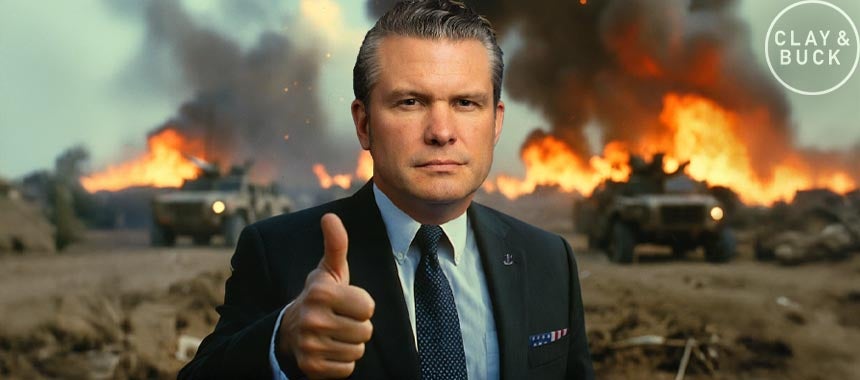
Epic Fury Update: Iran's Military DECIMATED – Navy Sunk, Missiles Gone, Regime Toast! What's Next?
Clay and Buck bring you the latest developments.
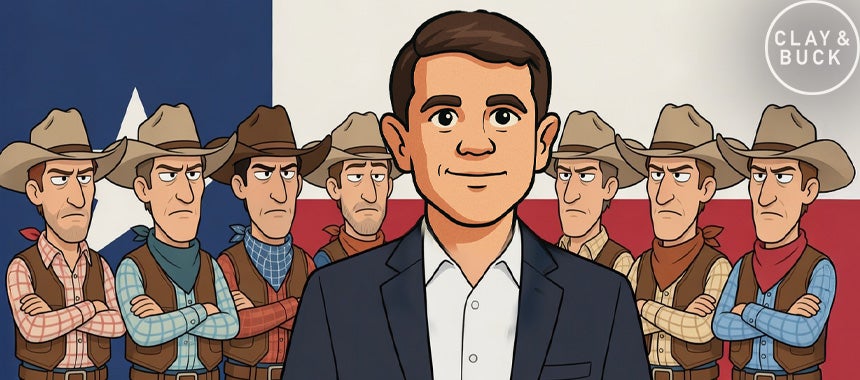
Talarico CRUSHES Crockett – Now Texans See His WILD Radical Takes Exposed!
This guy's no moderate. Clay & Buck have the receipts.
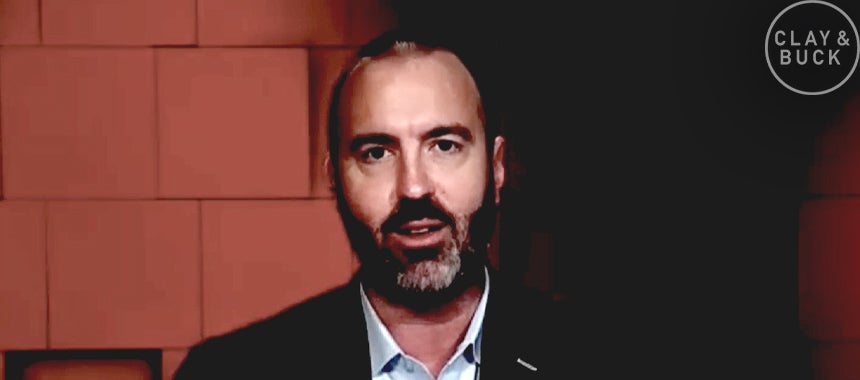
Jesse Kelly on the Texas Primary, War in Iran -- and Clay's New Tesla
When Jesse hangs with Clay & Buck, it's not to be missed.




